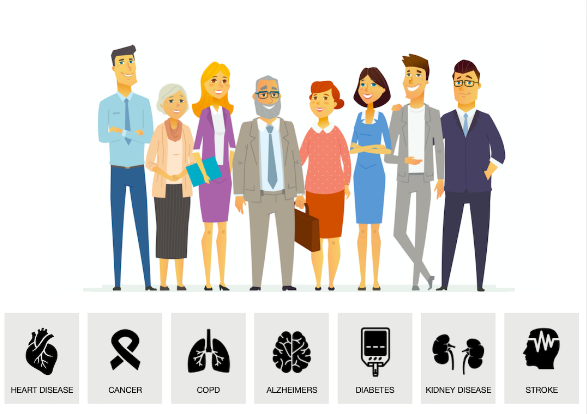Chronic Disease
What Is Chronic Disease ?
A condition known as a chronic disease is one that lasts for longer than three months on average. Genetics, dietary habits, and environmental factors are just a few of the many potential causes of chronic diseases.
Diabetes, heart disease, cancer, long-term respiratory illnesses, and arthritis are a few examples of chronic diseases.
Chronic conditions frequently need continuing medical care and can have a substantial influence on a person's quality of life.
They could also be linked to high levels of healthcare spending and utilization. Through alterations in lifestyle, such as regular exercise, a balanced diet, abstaining from cigarette use, and stress management, chronic diseases can occasionally be avoided or managed.
As they contribute significantly to the global burden of disease and mortality, chronic diseases pose a serious threat to public health. Chronic diseases can have wider economic and social effects on people, families, and communities in addition to their personal health effects.
Promoting healthy behaviors, enhancing access to healthcare, and addressing social determinants of health are frequently the focal points of public health initiatives to prevent and treat chronic diseases.
Chronic Disease Side Effects ?
Depending on the particular condition and how severe it is, chronic diseases can have a wide range of adverse symptoms. The following are a few typical chronic disease side effects:
Chronic disorders such as arthritis, fibromyalgia, and chronic headaches can cause persistent discomfort that can be difficult to manage.
Fatigue:
Chronic diseases can cause fatigue that can affect daily activities and quality of life.
Reduced mobility:
Chronic conditions like arthritis and multiple sclerosis can cause diminished mobility and make it difficult to do everyday tasks like walking, standing, or using your hands.
Mental health problems:
Chronic diseases can lead to mental health problems such as depression and anxiety.
Cognitive impairment:
Memory loss, difficulty with reasoning and decision-making, and other cognitive impairments can be brought on by chronic diseases like Alzheimer's disease and other types of dementia.
Digestive problems:
Constipation, diarrhea, and vomiting are common symptoms of chronic conditions including Crohn's disease and ulcerative colitis.
Respiratory problems:
Chronic illnesses such as chronic obstructive pulmonary disease (COPD) can cause respiratory problems like shortness of breath and coughing.
Cardiovascular problems:
Chronic diseases such as heart disease can cause cardiovascular problems such as high blood pressure, chest pain, and heart attacks.
Skin problems:
Skin issues including dryness, itching, and rashes can be brought on by chronic illnesses like psoriasis and eczema.
Depending on the particular chronic disease and personal patient characteristics, these side effects can differ in severity and length. Effective chronic disease management and treatment can help to lessen some of these adverse effects and enhance quality of life.
How To Remove Chronic diseases From Our Life ?
Chronic diseases may not always be completely cured due to their complex origins and lack of available therapies. However, there are certain things we can do to manage chronic illnesses and decrease the negative affects they have on our lives.
Work with your healthcare provider:
The development of a chronic illness management strategy requires collaboration between you and your healthcare professional. This can require taking drugs, altering your lifestyle, and getting regular checkups for your illness.
Make healthy lifestyle choices:
By maintaining a balanced diet, getting regular exercise, giving up smoking, and controlling stress, the chance of developing chronic diseases can be reduced, and the management of existing conditions can be improved.
Get regular check-ups:
Regular check-ups and monitoring of chronic diseases can help to identify problems early and prevent complications.
Take medications as prescribed:
If medications are prescribed for your chronic disease, it is important to take them as directed by your healthcare provider.
Seek support:
You can manage the psychological and emotional affects of having a chronic illness with aid from friends, family, and support groups.
It's also crucial to remember that controlling a chronic disease may necessitate constant adjustments. By managing your chronic condition, you can improve your quality of life and reduce how much the illness affects your regular activities.


